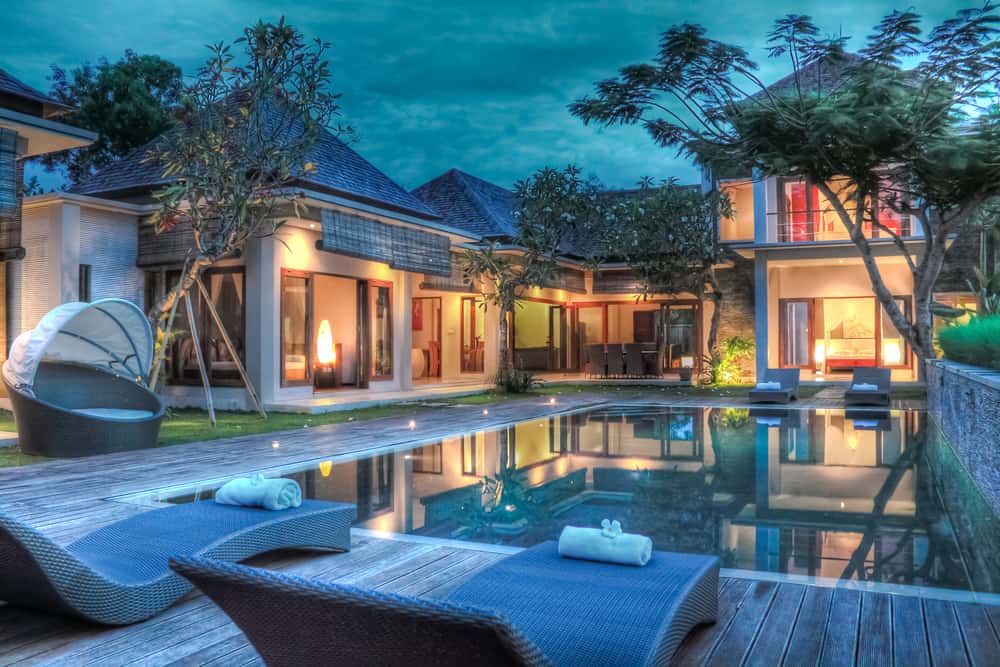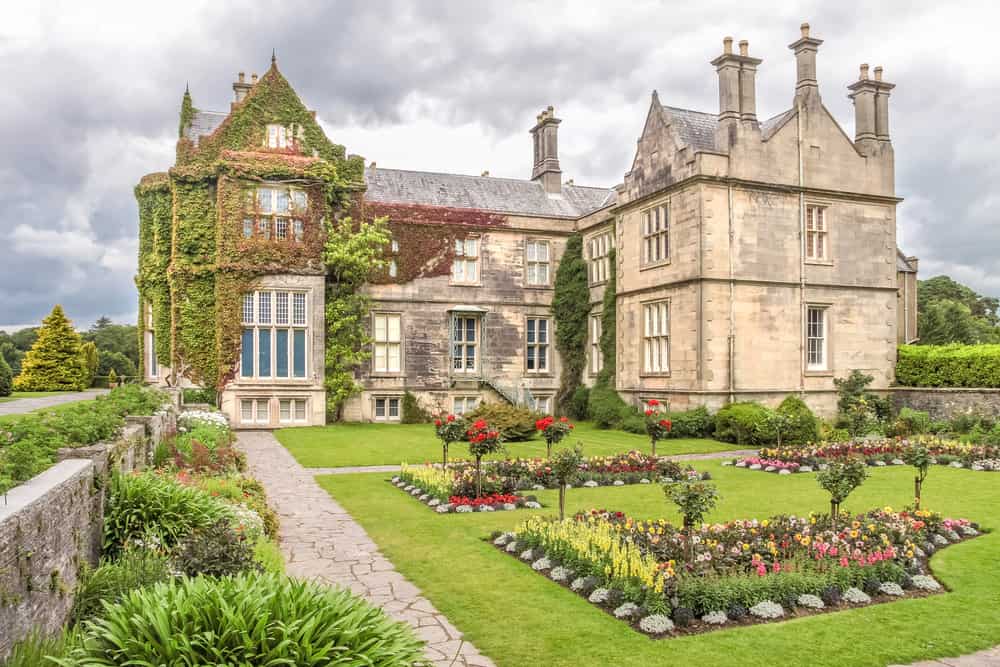Key Takeaways
Mansion definition |How big is a mansion? |What makes a house a mansion? | Mansion vs. estates | How much do mansions cost? | Are mansions a good investment? |
Most of us are familiar with the term ‘mansion’, but do we know how to define it? Does any large house count as a mansion or not? This guide will help go over the mansion definition and the unique features that set it apart from other property types and answer the question “What is a mansion? ”
What Is A Mansion?
A mansion is a residence that is both luxurious and awe-inspiring. Mansions typically feature high-quality building materials, expensive designs, and impressive amenities. Another important criterion is size, which we’ll expand upon in a moment.
Mansions do not have to meet an age requirement, meaning they can be old or new. Old mansions often showcase old-world features, such as a pool hall, a ballroom, or even sleeping quarters for live-in staff. New mansions might have modern amenities such as an indoor basketball court, spa facilities, or a theater room.
[ Thinking about investing in real estate? Register to attend a FREE online real estate class and learn how to get started investing in real estate. ]

How Big Is A Mansion?
According to Millionacres, real estate professionals agree that a mansion should be at least 5,000 to 8,000 square feet in size.
However, a mansions’ size is often dictated by location, budget, and context. Let’s take Beverly Hills, for example. This Los Angeles enclave is home to the rich and the famous, where real estate doubles as a status symbol. The Spelling Manor and the Pritzker Estates are famous 90210 mansions, and both are over 50,000 square feet. In this context, an 8,000 square foot home suddenly seems less mansion-esque.
In contrast, even 5,000 square feet is considered spacious in a location such as New York City. This is an area where real estate is crowded and space is limited. Even the wealthiest property owners own smaller abodes.
Because the spread in square footage is so large, it’s helpful to break up mansions into further sub-categories: mega mansion and McMansion.
Mega Mansion
The Google English dictionary explains that “mega” means “very large” or “huge.” In other words, a mega mansion is huge, even for a mansion.
Mega mansions are at least 20,000 square feet, although the exact threshold is up for debate. This vastly outsizes the mansion minimum of 5,000 square feet. According to Statista, the median size of a single-family home in the U.S. has hovered over 2,000 square feet for the past two decades. A mega mansion is at least ten times that size!
Many historical properties are mega mansions, including French chateaus and English manors.
McMansion
On the opposite end of the mansion spectrum we find the McMansion. This type of property is a far cry from a genuine, authentic mansion. They typically feature cheap building materials and architectural shortcuts.
The end result of a McMansion is a home that yearns to be grand yet comes off as ostentatious. An easy tell for a McMansion is the land it sits on. If a mansion “wannabe” sits on a small plot of land, the building itself will usually stretch out to the property line to maximize space. This is in contrast with authentic mansions that sit on extensive grounds with ample space for gardens and other outdoor amenities.
What Makes A House A Mansion?
Size is just one piece of the puzzle when it comes to mansions. Other criteria set mansions apart from other types of real estate, including building materials, amenities, and other upscale features.
Materials Used For A Mansion
Regardless of style, authentic mansions are known for using high-quality, natural materials. Many homebuilders use manufactured materials to cut down on costs, but no expenses are spared when it comes to luxury real estate.
Mansions often feature natural stones such as marble, granite, slate, and limestone. Natural woods are also incorporated, including exotic hardwoods. Ash, oak, teak, and ebony are all examples of materials used in a mansion.
Luxury & Entertainment
A mansion can serve as home to a large number of bedrooms and bathrooms, but the real magic lies in its amenities.
Mansions feature luxurious spaces that you wouldn’t typically find at your average property. The following are examples of entertainment and leisure features that have been found at mansions:
-
Movie theaters
-
Spa facilities
-
Greenhouses
-
Tennis and basketball courts
-
Bowling alleys
-
Custom bars and lounges
-
Polo fields
When money is no object, a homeowner can manifest their wildest dreams and fantasies in their mansions. If you had enough money, adding an obstacle course, horse racing track, or even a sky deck is all possible. Mansions are highly customizable and are often used as a symbol of one’s economic status.
Upscale Grounds & Location
Another key part of what makes a mansion a mansion is the land it sits on. Most mansions feature immense properties featuring gardens, tennis courts, fountains, or even hiking trails. It’s not uncommon to also find guest cottages and other types of additional units on the grounds. These are all elements that emanate a sense of beauty and spaciousness that only money can buy.
As always, location is a critical aspect of luxury real estate. For instance, it wouldn’t make sense if a mansion sat in a neighborhood of tract homes. You are most likely to find a higher concentration of mansions in areas where the average income is high or where land is plentiful.

What’s The Difference Between A Mansion & An Estate?
The key difference between a mansion and an estate is the size of land that they are built on. They both feature luxurious, impressive homes. However, estates are built upon vast plots of land. Historically, estates used to host farms, pastures, and even villages, creating their own economic systems.
How Much Does A Mansion Cost?
The price of a mansion varies, but the starting range is between $1 and $5 million. The most exquisite mansions, however, could cost tens or even hundreds of millions of dollars.
The price is determined by location, square footage, furnishing, and the range of luxury features and amenities. Some mansions may even sport a hefty price tag in part due to clout. For instance, a mansion designed by a famous architect would likely sell for much more than a comparable mansion designed by a lesser-known developer.
Are Mansions A Good Investment?
Mansions are generally a good investment. The luxury real estate market demonstrates consistent growth, despite economic downturns and even during a global pandemic. If you are fortunate enough to afford a mansion, you’ll be happy to find that there is no shortage of demand for luxury real estate. In general, mansions increase in asset value while also providing the promise of significant returns.
Buying & Selling Mansions On The Real Estate Market
The stakes for buying or selling a mansion on the real estate market are arguably high. The properties are very costly to build and acquire, and thus, both buyers and sellers are looking to make a good deal.
Working with an experienced professional is highly encouraged if you decide to buy or sell a mansion. As a buyer, your realtor will help you separate authentic mansions from McMansions. They’ll also help you determine if the purchase price is fair or not. Because the value of mansions is so subjective, it would be challenging for a novice to tell a good deal apart from a bad deal.
Sellers typically work with realtors as well. In some cases, they may even hire an agency team. This is because agencies often know how to leverage special techniques to get you the best possible offers, including listings, marketing, paid advertisements, home staging, open houses, and even parties to showcase the property. When the objective is to get an offer worth millions of dollars, the expense is well worth it.
Summary
What is a mansion? In this guide, we spent time exploring the definition of a mansion. Some criteria of mansions include square footage, location, plot size, quality, and luxury amenities. However, we also learned that what qualifies as a mansion is highly subjective. What one would call a mansion in one zip code would hardly qualify as a mansion in another. We also learned that there are “wannabe” mansions called McMansions, so be careful not to fall for these traps if you want to live in a genuine, bonafide mansion. At the end of the day, beauty and value are in the eye of the beholder.
Would you live in a mansion if you were given the chance? What are some dream amenities that you’d want this property to feature?
Ready to start taking advantage of the current opportunities in the real estate market?
Click the banner below to take a 90-minute online training class and get started learning how to invest in today’s real estate market!

